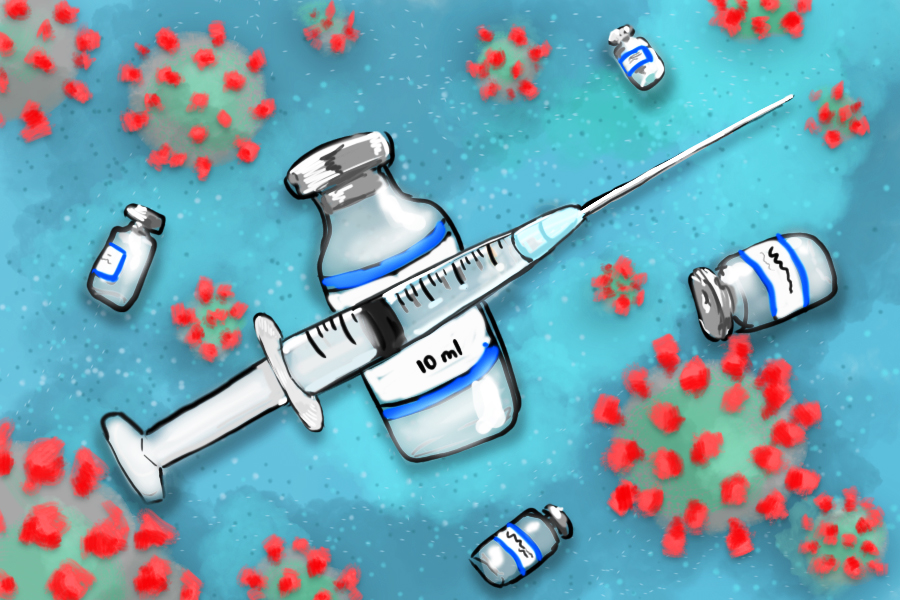Evanston area residents share COVID-19 vaccination experiences
Evanston residents and essential workers who have been vaccinated experienced symptoms from arm pain to fever, but all said getting vaccinated was worth the side effects.
March 4, 2021
Chioma Nkwocha, who works part-time at The Mather long-term care facility in Evanston, did not hesitate to get the COVID-19 vaccine as soon as she was eligible.
“I don’t know about you, but I would like to contribute to society going back to some kind of normalcy,” Nkwocha said, emphasizing the importance of protecting herself and her client.
Residents who are essential workers, have pre-existing conditions or are over the age of 65 are eligible to get the vaccine in Illinois’s stage 1B of rollout, though Mayor Steve Hagerty said those over 65 remain the priority. As of Wednesday, the city has fully vaccinated over 3,300 people with both doses of either the Pfizer-BioNTech or Moderna vaccine, according to the city’s new vaccine dashboard website.
Those who have been vaccinated say they’ve experienced a variety of symptoms, ranging from slight pain at the injection site to multiple days of feeling ill. Medical experts say people who have received vaccines can expect to feel flu-like symptoms after their inoculation — and that people cannot contract COVID-19 from the vaccine.
Nkwocha said she experienced injection-site pain after her first dose of the Moderna vaccine, but felt worse symptoms, like fatigue, after the second dose.
“I was watching ‘The Bachelor’ and I fell asleep,” she said. “I don’t fall asleep during The Bachelor.”
Dr. Sean Curry, an independently employed chiropractor in Evanston, received his second vaccine dose Feb. 13. Like Nkwocha, Curry’s symptoms were much more prominent the second time — they lasted longer, and were much more severe.
Curry said he woke up the morning after his second shot with a fever, severe nausea and “excruciating pain” in his spine, hands and shoulders. He said it took a few days for his fever to go away, but even then, he experienced a residual headache.
Nevertheless, Curry said he is glad to have been vaccinated. Now, he said he feels more security because he feels he will not contract the virus from one of the many patients he sees each day.
“I’ll be more than happy … to be sick for just a few hours and not have to deal with the terrible ramifications that can come from having the full-on disease,” he said.
Medical experts recommend residents continue to wear masks and practice social distancing even after they are vaccinated, until the country reaches herd protection.
Vaccine efficacy varies by provider, meaning those who have been vaccinated could still contract COVID-19, according to the Centers for Disease Control and Prevention. Additionally, the body needs a few weeks after innoculation to build immunity to the virus, and people who receive vaccines can still transmit the virus asymptomatically.
The CDC also confirmed side effects are more common for people who have received their second shots, and recommends people call their doctors if arm tenderness increases after 24 hours and side effects last longer than a few days.
However, Evanston resident Tamar Selch said she was pleasantly surprised when her experience receiving her second dose went smoothly.
She had the same soreness in her arm as her first shot, as well as a slight headache and some fatigue — but “nothing major.”
“I had heard a lot of horror stories from different people about the second dose,” Selch said. “I was actually expecting it to be much much worse than it was.”
Nkwocha said she hopes possible symptoms will not deter those considering getting vaccinated, and that she encourages those who feel hesitant about getting vaccinated to look to medical experts to better inform their decision.
“I know a lot of people have reservations about getting the vaccine,” she said. “I don’t think that people should just base it off what they see on social media or hearsay. Do your own research.”
Email: [email protected]
Twitter: @WKlunk
Related Stories:
— Illinois to expand vaccine rollout to residents with pre-existing conditions of Feb. 25
— As vaccine hesitancy threatens to increase COVID-19 disparities, local experts try to build trust












